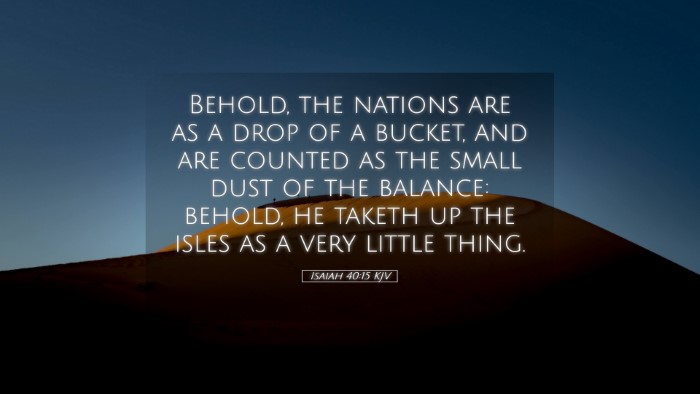Isaiah 40:15 - A Commentary
Isaiah 40:15 states: "Behold, the nations are as a drop of a bucket, and are counted as the small dust of the balance: behold, he taketh up the isles as a very little thing." This verse presents a profound observation about the comparative insignificance of nations in relation to God’s power and majesty. Through the insights of historic theologians, we can deepen our understanding of this passage and its implications.
Contextual Overview
This verse comes from a section of Isaiah that emphasizes comfort and hope for Israel, especially during their exilic period. The entire chapter emphasizes God’s sovereignty and greatness, opening with a call for comfort to God’s people, and it contrasts human frailty with divine omnipotence.
Theological Significance
Understanding the theological significance of Isaiah 40:15 can greatly impact how we view God’s relationship with humanity. The verse serves to remind believers that:
- God’s Sovereignty: The nations, regardless of their might or influence, are merely as insignificant to Him as a drop in a bucket.
- Human Pride: This depicts the futility of human pride and power in the face of God’s glory.
- Divine Perspective: God’s perspective is vastly different from human perspective; what we deem significant may hold little weight in the divine economy.
Commentary Insights
Reflecting on the insights of Matthew Henry, Albert Barnes, and Adam Clarke enhances our comprehension of this scripture.
Matthew Henry's Commentary
Matthew Henry, in his exposition, underscores the idea that the mightiest nations are but drops in the great ocean of God's creation. He notes that:
- The metaphor of a "drop in a bucket" illustrates how little impact human endeavors have when compared to God’s will and purposes.
- He emphasizes God’s ownership and control over all that exists, including nations, emphasizing their momentary relevance.
- Henry's perspective accentuates the contrast between human focus on scale and God's measure of significance, which is influenced by His divine purpose.
Albert Barnes' Commentary
Albert Barnes offers a critical analysis of this verse by highlighting the following aspects:
- He elaborates on the Hebrew word used for "drop," suggesting it means something that is inconsequential, underscoring God’s dominion over the earth's powers.
- Barnes emphasizes that God’s power is not just supreme over nations but extends beyond human understanding, garnering a greater respect and reverence for His sovereignty.
- This commentary encourages believers to reassess their worries regarding worldly powers, reinforcing that God is in ultimate control and does not regard nations as paramount in His plan.
Adam Clarke's Commentary
Adam Clarke's interpretation ties the verse to the idea of human humility before God’s majesty:
- Clarke elucidates that the term "dust" symbolizes the triviality of human strength and achievement, thus calling for humility from nations and rulers.
- He also warns against placing too much trust in worldly leaders, pointing to God's omnipotence as a source of true security and refuge.
- This approach instills a sense of comfort for believers, reminding them that regardless of earthly chaos, God is the anchor of stability.
Practical Applications
While the rich theological implications may resonate with pastors and theological scholars, practical applications from Isaiah 40:15 can be equally vital:
- Humility in Leadership: Leaders should embody humility, recognizing that their authority is derived from God.
- Trust in God’s Sovereignty: In turbulent times, believers are reminded to place their trust in God rather than human institutions.
- Encouragement for the Faithful: This verse is a source of comfort for believers feeling overwhelmed by worldly challenges, providing assurance of God’s omnipotence.
Conclusion
Isaiah 40:15 is a powerful reminder of God’s supreme authority over all nations and serves as a call to recognize our place within His grand design. It encourages the faithful to engage with humility and trust in God’s overarching plan, reminding us that the powers of this world are insignificant in the light of His glory. Such insights from cherished commentators enhance our individual and collective understanding of this essential biblical truth.
May this exploration inspire deeper reflection and action as we seek to understand God's word and apply it meaningfully in our lives and ministries.


